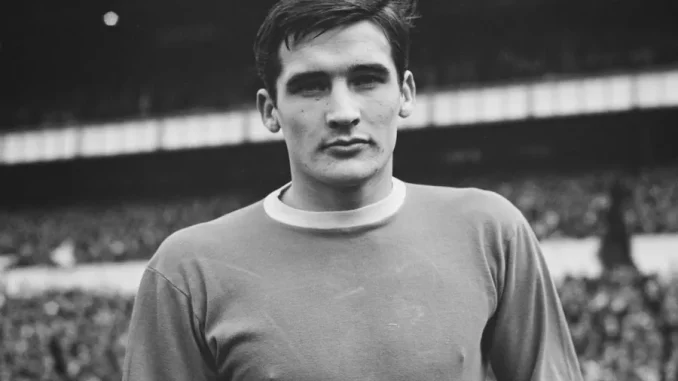
The loss of John Hurst, who was 76 years old, has left the Everton Football Club community very upset.
Today, after a protracted illness, John passed painlessly from his home.
“Gentleman Jack” Hurst was a member of Joe Royle’s backroom staff in the 1990s, a league championship winner, an FA Youth Cup winner, and a lifelong supporter of the team he loved.
In Everton’s 145-year history, only 16 players have made more appearances than him. However, what really set the calm defender apart was how he played in those 404 games.
It was certain that John Hurst wouldn’t transform a drama into a catastrophe, according to Ivan Ponting in Everton Player by Player. “The tall, lanky center-back had one of the coolest minds in football, and he would always be at the center of the storm when Everton’s goal was under assault. He would quickly and calmly diffuse the situation before looking for an opportunity to set up the Blues’ next attack.
“However, ‘Gentleman Jack,’ the most reserved man in the Goodison dressing room, performed his duties so quietly that he received very few public accolades. But among his contemporaries, there was no shortage of acknowledgment inside the game. He was well-known for being a model employee who provided consistency and elegance in equal and large amounts.
“When he returned to Everton for a spell as youth coach during the 1990s, the new generation of Blues could not have wished for a more impeccable role model.”
Hurst brought through Michael Ball, Danny Cadamarteri, and Richard Dunne as members of the youth group.
“John didn’t just coach the youngsters; he instilled values and standards into the group,” said former Blues attacker Cadamarteri. He was aware of what it meant to be an Everton player and acted accordingly. He also carried expectations along with his very high standards.
“You were aware of what was needed, and his communication skills were excellent. He told us the truth, which is crucial for a young athlete. He didn’t give out praise all the time, but when you did, you knew you did well!
You may refer to him as “old school,” but because he had been there and done it, I would describe him as “real school.” His coaching sessions were always enjoyable for me, and he was a wonderful man as well.”
Hurst had been a rising talent in his teens.
He had won the FA Youth Cup in 1965, when he calmly crashed home the winning penalty kick against Arsenal to win the cup for the first time at Goodison.
Quickly promoted to Harry Catterick’s senior squad, he made Everton history by becoming the first player to be substituted in a league game, taking Fred Pickering’s place in August 1965.
An overly critical referee even denied him a spectacular debut in that encounter against Stoke City.
“Hurst headed into the the objective splendidly,” as indicated by a new report, “just to find the score denied by the impact of the ref’s whistle a brief moment before the score might have become lawful.”
John recalled, “Those were the days before tactical substitutions.” I entered the stage in place of Fred Pickering, and you only continued if someone was hurt.
It was almost the perfect debut. We were ready to head the ball into the goal at our last corner when the referee sounded his whistle for full time. It was unbelievable to me!
John showed unwavering commitment and allegiance to the club.
Rosemary, his devoted 55-year-old wife, famously said, “John was a dedicated player; he’d have died for Everton.” Although he was very devoted and suffered injuries on a regular basis, it would take something quite terrible for him to give up playing. I recall that he once had his skull slashed open and had a split eye. He left, got sutures, and returned with a skullcap on. He had an obvious appetite for hardship.
Even on the day of the 1968 FA Cup semifinal, Hurst was diagnosed with hepatitis, but he overcame the illness to compete in the Wembley final.
He continued to be a fixture for the following two seasons, which included the league title-winning campaign of 1969–1970. In that season, he actually led the team in scoring after the first two games—a fact he would later continuously make fun of in jest with his dear buddy Joe Royle.
Hurst’s playing career at Everton ended in 1976, when he signed a contract with Oldham Athletic. Over the course of 11 seasons, he made 404 appearances and scored 34 goals at Goodison Park.
When Royle was named manager of Goodison in 1994, he went back to work there as a junior coach, and he stayed on even after undergoing heart bypass surgery soon after the FA Cup final in 1995.
Even though he left the club a second time in 1997, the Everton family never forgot him.
The Everton Heritage Society gave him the Dixie Dean Memorial Award in 2019.
The Liverpool Echo commissioned the Dixie Dean Trophy in 1980 to honor the life and accomplishments of the man whose name it bears. Notably, the front of the trophy has the inscription “For Sportsmen in the Great Tradition.”
Hurst was a very fitting winner.
He departs from his children, Samantha and Alexandra, as well as his wife, Rosemary.
Farewell, Hursty.
Leave a Reply